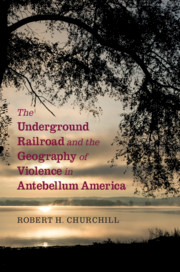Book contents
- The Underground Railroad and the Geography of Violence in Antebellum America
- The Underground Railroad and the Geography of Violence in Antebellum America
- Copyright page
- Dedication
- Contents
- Maps
- Acknowledgments
- Introduction
- Part I Origins to 1838
- Part II 1838–1850
- Part III 1850–1860
- Epilogue
- Appendix
- Index
Epilogue
Cultures of Violence, Secession, and War
Published online by Cambridge University Press: 16 December 2019
- The Underground Railroad and the Geography of Violence in Antebellum America
- The Underground Railroad and the Geography of Violence in Antebellum America
- Copyright page
- Dedication
- Contents
- Maps
- Acknowledgments
- Introduction
- Part I Origins to 1838
- Part II 1838–1850
- Part III 1850–1860
- Epilogue
- Appendix
- Index
Summary
The Epilogue explores the impact of competing cultures of violence on secession and the coming of the Civil War. The collapse of the Fugitive Slave Act convinced many in the South that slavery could no longer be preserved within the Union. The rendition of Lucy Bagby from Cleveland, OH, in 1861 marked an attempt to conciliate the South by rebuilding a national consensus on the normativity of proslavery violence. The public condemnation of the Republican officials who returned Bagby to slavery, along with the party’s rejection of compromise measures, demonstrated that this consensus could no longer be restored. For many in the North, the violence of mastery was a moral horror that they were determined to repudiate. For white Southerners, however, the violence of mastery lay at the heart of their understandings of identity and membership in the national community. The violence of mastery also shaped the manner in which the South approached separation from the North, producing acts of aggression and demands for submission during the secession winter of 1860–1861. The Civil War was thus in part the product of an irreconcilable conflict in the cultural perception of violence.
- Type
- Chapter
- Information
- Publisher: Cambridge University PressPrint publication year: 2020

